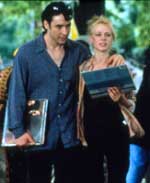
Rob Gordon (John Cusack), who runs the Chicago retro record store Championship Vinyl, is a maestro at creating compilation tapes, and High Fidelity, the movie he figures in, is something of a compilation tape, too. It’s Rob’s confessional – he often speaks directly to us – and its rhythms are alternately sodden, imploring, rapt, antic. Stephen Frears, directing from a script by D. V. DeVincentis, Steve Pink, John Cusack, and Scott Rosenberg based on the highly regarded London-based Nick Hornby novel, doesn’t keep things on an even keel; that’s not his idea of a good time. The film has the herky-jerky propulsion of an interior monologue, but there’s no real rage lurking inside Rob’s obsessiveness. He’s too shallow for that, too juiced by his own funk. Frears has made a movie about extreme narcissism that somehow also manages to be self-effacing. The discombobulated lives on display, despite all the turmoil and regret, are essentially comical. Frears’s characters see themselves as players on a stage; the drama being enacted is the battle of the sexes, and they enjoy gaping at their own spectacle. They’re bemused by how screwed-up they are, and how screwed-up everybody else is, too.
When Rob’s live-in girlfriend, Laura (Iben Hjejle), walks out on him because she doesn’t see him moving on in his life, the rupture kicks off a long-term wallow in which he ranges back over his catalogue of Top Five Breakups. (Rob is always making top-five lists, such as Top Five Songs About Death and Top Five First Cuts on First Albums.) The flashbacks to these breakups, which begin with a spurning in middle school and move on past the college years, are like little blackout sketches, piquant and deadpan. They encompass a wide range of female partnership, from the mousy to the chaste to the glamorous (Catherine Zeta-Jones plays Charlie, the glamour-puss). The film is saying that women, in their own special ways, mess men up (and perhaps men deserve it). Later, Rob comes up with the notion of actually getting back in touch with his top five. The before-and-after contrasts are predictable: Everything has changed, nothing has changed. Laura is right. Rob hasn’t really moved on in his life; he’s stuck in the same vinyl groove. But she’s wrong too, and maybe this is why she keeps drifting back to him even after walking out. What she senses is that their breakup is a scrambling of all the big breakups he’s ever had, a compilation tape of cracked connections, and that maybe he’s ready to change tracks. Still, she’s clear-eyed about Rob’s mopiness, and her sporadic re-entrances into his life seem to be more for his benefit than for hers. She’s a generous jilter.
Even though High Fidelity is framed as a male confessional, it gives its women equal space in the confession booth. (It could stand as a companion piece to Cusack’s earlier Say Anything.) There’s no rancor in this film’s view of men’s waywardness and no great sentimentality either. If the Woody Allen of a few decades ago had made this movie, he might have turned it into a nutty, prickly harangue; Albert Brooks, who has already covered some of this same terrain, especially in Modern Romance, would have brought out the natteriness and raging ego in his lovelorn stupe. John Cusack plays Rob as a living contradiction, a restless layabout. Todd Louiso and Jack Black, who play Rob’s co-workers in the record store, are bookends of guy geekiness; the latter is a stumpy, wise-ass know-it-all, and the former, with his chalky pallor and faint eyes, is so recessive that he’s practically a revenant.
Cusack, who was so remarkable in Frears’s The Grifters, seems to respond particularly well to this director, embodying his every-which-way sensibility. Cusack can go from explosive to winsome in a flash, and then on to something else entirely, and it all adds up. This quality makes him the perfect actor for a movie in which, without being highfalutin about it, he has to play a youngish Everyman. He projects, at various times, all the flavors of male privilege, and the various females he provokes all respond to different aspects of him. Except Laura, who seems to “get” him in toto. Rob gets Laura, too; he’s sharp-eyed about the ways of women. He just can’t do all that much, in the end, with his information.
As a man-out-of-time, Rob seems peculiarly up-to-date. In his mid-twenties he was afraid of being alone for the rest of his days, and now, a decade later, he’s caught between postadolescence and a premature midlife crisis. He’s a welter of wacked-out life cycles, and there’s something appealingly familiar about his mishmash. He’s the scraggly standard-bearer for his generation. His retroness is half of who he is; musically, he’s hip to both boomer rock perennials and punk and hip-hop, and he has a snob’s taste in both. It’s the middle range, the soft-pop standards, he can’t abide. (He can’t understand how Laura can like both Art Garfunkel and Marvin Gaye.) Rob’s musical tastes are keyed to his emotional situations; at times, he seems to live his life in either a rave or a dive. He frequents a bar with a sign saying al capone drank here often, and he points out for us the movie theater where John Dillinger – betrayed by a woman, of course – was gunned down. For Rob, Chicago indulges his hurt feelings, and it plays into his charade of being, in some small way, both gangster and gangsta. It’s a city where he can keep his options open. High Fidelity is the rare comedy that gets inside the ways men try to make sense of themselves, and it does so without special pleading. It’s a sweet, raffish entertainment, blessedly free of baloney.